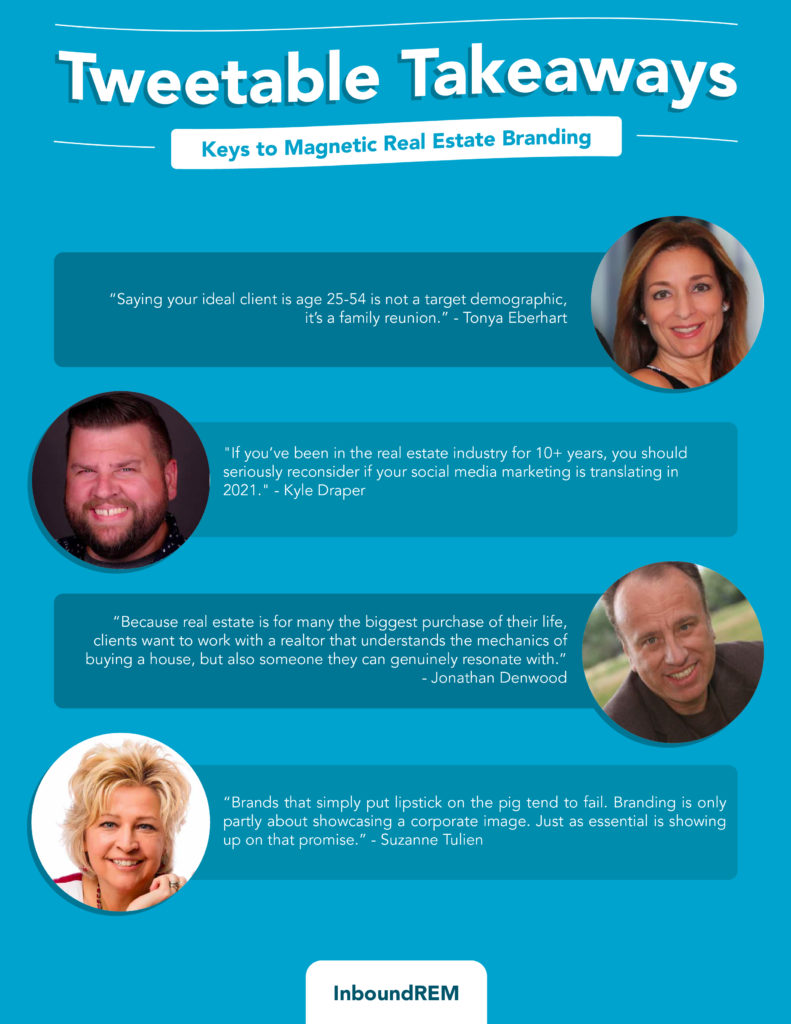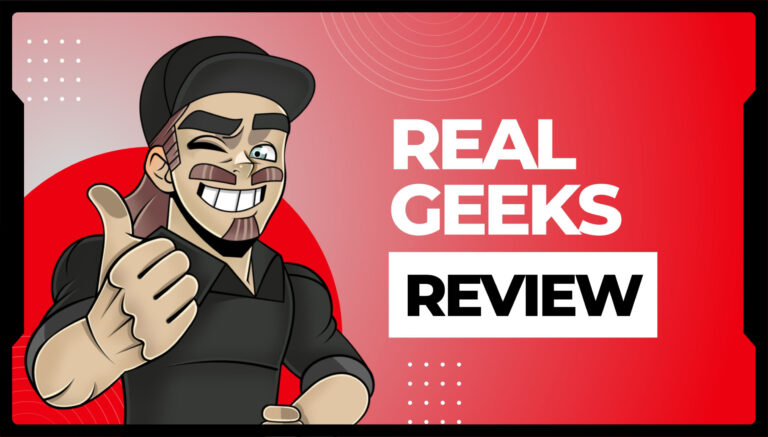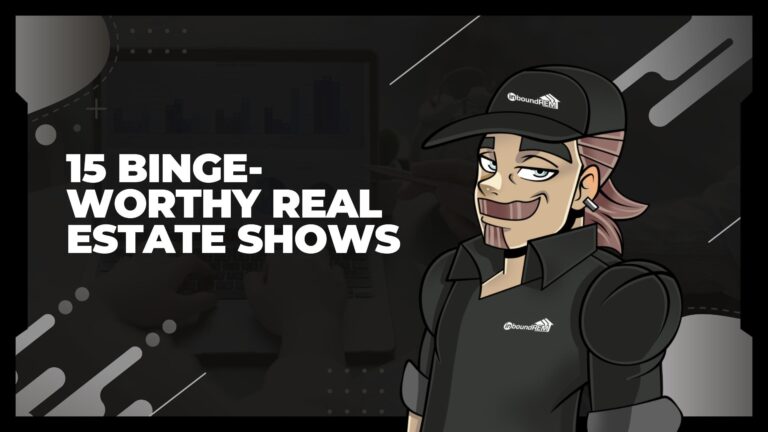Basic Real Estate Branding Strategies
Real estate branding is an essential aspect of any successful real estate business. It’s what sets your company apart from others in the industry and helps to establish trust with prospective clients.
In this blog post, we’ll explore some real estate branding strategies and ideas to help you build a strong brand identity that resonates with your target audience.
We’ll also talk about how real estate branding has changed over the past decade. Your real estate company should have a real estate branding strategy that matches the current marketing climate.
Finally, we dive into advanced real estate branding strategies and tips.
All in all, this real estate branding guide provides everything a real estate agent need to develop a strong personal brand with a positive energy that speaks to prospective customers and potential buyers.
1. Understand Your Target Audience
Before diving into any branding efforts, it’s important to understand your target audience. Who are your prospective clients? What are their needs and pain points?
By understanding your target audience, you can create a consistent brand that speaks directly to their needs and establishes a connection with them.
2. Create a Visual Identity
Your visual identity is one of the most important aspects of your real estate brand.
This includes your brand logo, brand colors, and other branding elements that will be used across all of your marketing materials, including your website, social media channels, and promotional materials.
These details play a strong part in creating a consistent, one of a kind real estate brand.
Consider hiring a graphic designer to help you create a strong and consistent visual identity that will help you stand out in a crowded market.
3. Develop a Strong Personal Brand
Personal branding is becoming increasingly important in the real estate industry. By developing a strong brand identity, you can establish yourself as a thought leader in your field and build trust with prospective clients. This can be achieved through blogging, social media posts, and community events.
4. Embrace Digital Marketing
Traditional marketing techniques like direct mail are still effective, but digital marketing is becoming increasingly important in the real estate industry.
This includes social media marketing, video marketing, and other digital marketing techniques that can help you reach a wider audience and provide valuable industry information to prospective clients.
5. Establish Trust with Prospective Clients
Trust is an essential aspect of any successful real estate brand.
By providing excellent customer support and consistently delivering on your promises, you can establish trust with prospective clients and ensure that they’ll be more likely to work with you in the future.
Add Branding into Your Business Strategy
It’s important to incorporate your real estate branding efforts into your overall real estate business strategy. That’s true whether your a large real estate company or an individual real estate agent.
This means ensuring that all of your marketing materials, including your website, social media accounts, and promotional materials, are consistent with your brand’s identity.
It also means staying up-to-date with industry trends and continually evolving your brand to ensure its survival.
The video below is a deep dive into the changing world of real estate branding. It clarifies how your real estate branding process should look in 2023.
Real estate branding is an essential aspect of any successful real estate business.
By understanding your target audience, creating a strong visual identity, developing a strong brand identity, embracing digital marketing, establishing trust with prospective clients, and incorporating branding into your business strategy, you can build a strong, recognizable and consistent brand that resonates with your target audience and helps you achieve your business goals.
How Real Estate Branding Is Changing and What it Means for Agents
In the world of real estate marketing, branding has long been a key component of an agent’s success.
For years, agents have pursued a style of branding that would be similar to a big corporation, using traditional methods such as newspapers, bus benches, radio, and television.
However, over the past decade, real estate branding has shifted dramatically. It is changing so much that it might as well be a completely different thing than what it used to be.
In this section, we will discuss exactly why real estate branding is changing, what the evidence is for this change, and how this change is affecting the industry as a whole.
We will explore how real estate branding used to work, why social proof is now more important than press, and why personal branding has become so important in today’s market.
How Branding Used to Work
In the past, real estate agents pursued a style of branding that was similar to a big corporation. They used traditional, non-digital marketing methods.
In addition, having a name like Coldwell Bankers or Hilton Highland carried weight. People would come into their showroom and arrive at their office en masse, trying to set appointments with real estate agents because that brand meant something.
However, this is not the way it works today in most major marketplaces.
The Importance of Social Proof
Today, social proof is more important than press or hype, especially in the real estate business.
Social proof, a psychological phenomenon where people rely on the opinions and actions of others to make decisions, can make or break a real estate agency. It is the idea that if other people are working with an agent, then that agent must be trustworthy and capable.
Potential clients want to see more than just impressive sales figures. They want to know what kind of experience they can expect from working with a real estate agent. They want to know if the agent is kind, helpful, supportive, and available.
This is where social proof comes into play. Agents who have positive reviews and satisfied clients are much more likely to attract potential clients and earn their trust.
In the past, clients would look for a big corporation to handle their real estate needs. However, consumers have shifted towards wanting to work with individual real estate agents. They are looking at all the key takeaways, such as social proof and knowledge, and finding those things online.
How to Demonstrate Social Proof
This shift has given real estate agents the ability to put their personal message out there using tools like Instagram, Google My Business, and Facebook.
These platforms provide a space for real estate agents to showcase their skills and services to potential clients. They also offer a platform for clients to leave reviews and ratings of the agent’s services.
This can be a valuable asset for real estate agents, as it allows them to build their reputation and attract more business.
Real estate agents who are savvy enough to make sure that their clients communicate all of this online in digital format are the ones who are winning in today’s market.
By showcasing positive social proof, knowledge, and satisfied clients, real estate agents can stand out in a crowded field and build a successful real estate business.
The Rise of Personal Branding
With the shift towards personal branding, agents are no longer pursuing a style of real estate branding that is similar to a big corporation. Personal branding is more important than ever because consumers want to know who the agent is before they call them.
They want to know what the agent can do for them before they ever give them a ring.
Personal brand is all about creating a relationship between the agent and the consumer. Consumers want to feel like they know the agent before they even meet them. This is why personal branding has become so important.
Consumers can find out information about an agent’s market updates, boots-on-the-ground experience, and overall personality through social media.
Personal branding is all about creating an online persona that resonates with consumers. Agents who are able to create a strong personal brand with lots of social proof are the ones who are winning in today’s market.
Free eBooks for Agents

Download any or all of our real estate marketing eBooks. These books contain cutting edge information, deep-diving case studies, actionable hacks to skyrocket your business.
Advanced Real Estate Branding Ideas
We’re finishing this real estate branding guide by sharing this treasure chest filled with nuggets of the best real estate branding ideas out there.
We’ve had the pleasure of interviewing several of 2021’s best realtor branding experts on the MailRight podcast, including Tonya Eberhart, Michael Carr, Kyle Draper, Christophe Choo, and Suzanne Tulien.
The real estate branding ideas we’ve gathered are highly relevant and timely for creating a magnetic real estate brand for any real estate agent or real estate company.
How To Develop a Personal Real Estate Brand
The first step in developing a personal brand is asking yourself a series of questions.
- Why do you love working in the real estate industry?
- What makes you different?
- Who is your ideal client?
1. Your Passion
If you don’t love working in real estate, it’s going to be much harder to develop a brand that magnetizes clients. As Suzanne Tulien mentioned on our podcast, real estate branding is really about the way people perceive you more than the message you communicate. Apathy is repelling, but passion is charismatic.
If working as an agent or broker does bring you joy, brainstorm a list of the reasons and moments that’s true. Knowing how you find meaning in your work will inform the rest of the process.
You should also tattoo that list on your mind for personal interactions. Always be ready and proactive about explaining why your job is more than just a job.
2. Your Branding USP
You need to understand and communicate your brand identifier. You can also think of this as your Unique Selling Point or simply what makes you stand out.
There are two parts to your identifier. The tip of the iceberg is a zippy, memorable, slogan-like identifier. The rest of the iceberg is your personal story.
Slogan Identifiers
Michael Carr presents himself as America’s top selling real estate auctioneer. Another example Tonya mentions in the podcast is a Virginia realtor who brands himself as the American Dream Agent. Or take Denise Dakoulis, who brands herself as The Skydiving Agent.
Perhaps you’re the best negotiator in your area, or you have the fastest closing times. You may be an expert in waterfront properties in a lake town or simply the most personable realtor in your area with loads of reviews to back that up.
Assess your professional and personal life, then find a unique way to crystalize your uniqueness into a 3-8 word identifier.
Personal Story
Beyond that, your personal history should always play a role in your real estate branding.
This is a technique that I will champion to the end of my career, and it dovetails perfectly with the BrandFace® approach of building your brand around a real person.
For example, we interviewed Tim Stout on the MailRight podcast, who leverages his background as an MMA fighter in his real estate business.
You don’t need to have a flashy shtick when drawing on your story to create a unique personal brand. I ran large call centers for 20 years, which isn’t the most riveting background, but I can communicate at the drop of a hat how that informs my expertise.
You may have experience with business negotiotions or you may have served in the military, which should always be showcased among realtors.
Read our articles on creating the perfect real estate bio and using real estate video marketing to find out more about how to coopt your story into your personal real estate branding.
3. Your Ideal Client
“Saying your ideal client is age 25-54 is not a target demographic, it’s a family reunion.”
Tonya Eberhart Tweet
Your ideal client should be someone (1) in your niche and (2) fairly similar to you.
However, if your market is a small area of 50,000-250,000 people, it can be unwise to specialize in a particular niche. In that case your ideal client may not be niche-specific.
But you can still use an identifier because identifiers aren’t necessarily specific to real estate niches.
As for appealing to clients that are fairly similar to you, Jonathon Denwood mentions, “By appealing to everybody, you appeal to nobody.” He elaborates,
“Because real estate is for many the biggest purchase of their life, clients want to work with a realtor that understands the mechanics of buying a house, but also someone they can genuinely resonate with.”
Jonathan Denwood Tweet
"If you’ve been in the real estate industry for 10+ years, you should seriously reconsider if your social media marketing is translating in 2021."
Kyle Draper Tweet
Kyle’s approach to real estate branding revolves around harnessing the power of storytelling on social media.
I also talk a lot about the marketing effectiveness of narrative for both myself and my clients, so I stand behind this idea 100%.
1. Capitalize on moments that have both professional and personal elements.
One of the secrets of Top 1% real estate agents is to focus on building connections rather than generating leads. When your marketing strategy pivots around authentic personal engagement, you automatically will have a professional life full of meaningful moments.
For example, we encourage realtors to host cocktails parties for all their recent clients in our article on choosing the perfect real estate closing gift. Or sometimes realtors take clients out to a celebratory dinner. One agent really went the extra mile and donated 13 inches of her hair to Locks of Love because her client’s daughter was diagnosed with cancer.
All these examples are so people-centric that they outwardly don’t seem like marketing at all. For that reason, they all make perfect candidates for social media posts that draw your audience into your life while demonstrating your professional value.
Check out our 2021 Ultimate Real Estate Marketing Plan for more thoughtful and powerful marketing strategies that harness the power of community engagement to generate referrals.
2. Share the ups and downs of the process, rather than only showcasing professional highlights.
Conflict is central to storytelling. People don’t read stories where everything runs smoothly. The same principle absolutely applies to your social media audience.
Expand your idea of great content to include a wider range of emotions beyond joy and gratitude. Consider the way COVID-19 impacted your real estate business. Did you ever post about the struggle or even heartbreak during that challenging time?
It’s important to avoid appeals to pity. But sincere posts about your challenges, rounded off with hope and perseverance, can create much more engagement than a whitewashed social media presence.
Think about your followers as your community, rather than a lead generation pool.
For sure, you can and should set certain boundaries. Professional social media accounts are not the right platform to share political opinions or grieve publically. But they are the perfect place to be relatable, authentic, and human.
3. Drop your opinions about what kind of posts are best and follow the data.
Many realtors, especially those new to social media marketing, produce content that’s strictly about their professional lives.
People are nosy by nature. Personal, casual social media posts that provide a window into your life may resonate more than you’d expect. On the other hand, professional social media accounts that post 100% about real estate can generate less interest from your followers.
As you create different kinds of social media posts, let the metrics dictate future posts. Personal posts get likes and comments, and listing posts get leads.
The catch-22 is that you’ll never generate leads until you have an established, active, and growing following. That’s where relatable posts come into play.
4. Expand storytelling beyond social media.
One of the best, but often overlooked places, where you can implement the power of storytelling is your real estate bio.
Though it can be difficult to convince my clients to post a video introduction of themselves to their website, LinkedIn profile, etc., those who do so find it to be massively rewarding. Check out our article on crafting the perfect real estate bio for a complete guide on how to capture attention and drive leads.
5. Inject *your* personality into posts
Katie Page, a realtor serving South Carolina, has some wonderful examples of how to make social media posts shine. Katie uses her professional training as a dancer to add a unique and personal spark to her online presence.
Consider which elements of your personal life you can leverage in your social media.
Do you have a couple of rescue dogs? Post a video of them playing in the backyard of a client’s new home along with your client’s dog. Mention how the new homeowners are even more overjoyed with the space, especially since you bought them an outdoor hammock as a closing gift for lazy Sunday afternoons.
Schedule a Meeting
Let’s chat about how an SEO-focused website that YOU OWN, Google Business Profile Campaigns, or Custom Email Campaigns can generate high-quality leads and exceptional long-term ROI. If my services aren’t the best move for you, I’ll gladly point you in the right direction
Real Estate Branding and Video Marketing
Christophe Choo’s style of video marketing takes the BrandFace® approach of branding around a person to the next level.
Even though real estate branding through video marketing is a powerhouse technique, I can feel some of you pulling away. I know from personal experience how difficult it can be to convince realtors to get on board.
That’s why I can’t say this enough…push past your anxiety about filming yourself because the benefits are extraordinary. And the fact that so many realtors hesitate to get on camera is actually great news for you.
It means it’s that much easier to differentiate yourself from the pack. If you’re a millennial realtor, leverage your relative comfort with your smartphone to gain an advantage over more experienced realtors. If you’re a veteran realtor who resists the idea of video marketing, understand that it’s going to continue growing into a foundational aspect of real estate branding. Consider Austin Glanzer and his rapidly growing audience of 83,000 followers on TikTok.
Tips for Real Estate Video Branding
Christophe loves luxury and spends tons of time shopping on Rodeo Drive and cruising through the neighborhoods he represents. He just films these things and talks about them. Simple as that.
In doing so, he brands himself as a relatable personality for clients in the luxury real estate market.
To be fair, this tip is more about real estate video marketing, rather than branding. But consistency can absolutely be part of your core values, and regular posting can demonstrate professional commitment.
Christophe publishes new real estate video two or three times a week. But you can have a successful video marketing campaign with a much less rigorous schedule. Consider posting two times a month while you gain expertise and an audience.
People buy from PEOPLE more than they buy from messaging in 2021. Real estate video branding is about presenting a real and relatable human to your audience.
Ok, now this is crucial. You can create effective videos without high production value or even a regular posting schedule.
Check out this simple introduction video from realtor Shannon Sisk. It’s a great example of a single video you can post to your website, Facebook page, LinkedIn profile, etc. This 30-minute process can put you head and shoulders above your competition. Potential clients feel like they’ve already met you, which makes it much easier for them to give you a call.
1. “Delivering on your real estate brand requires consistency, authenticity, and delivering on your unique promise.”
Suzanne Tulien Tweet
This statement is more powerful than it may seem at first glance. Often agencies see their brand as nothing more than corporate personality and stylization.
In some cases, real estate professionals understand that their brand is also a matter of how they convey their core values through their marketing strategies.
But too often they fail to realize that ultimately their brand is not about the message a company delivers to the public, but how well the public believes that message.
In real estate, strong branding must extend beyond logos and slogans—it should be reflected in how you present yourself at every touchpoint.
Whether it’s handing out a business card, hosting an open house, or attending a networking event, your brand should always lead with accessibility and professionalism.
Some agents are now using the QR Code generator to reinforce this branding.
By adding a dynamic QR code to your branded business cards, yard signs, or event materials, you instantly give potential clients direct access to your listings, portfolio, or contact form—without asking them to type in a link.
It’s a simple yet effective way to connect offline branding with your digital presence, helping you stay memorable and making client engagement seamless.
2. “Your brand is just a perception. Everyone already has a personal brand, it’s just a question of whether you are in control of it.”
Suzanne Tulien Tweet
The key to controlling the perception is the first quote we mentioned. It’s a matter of consistently and authentically delivering on the promise that your marketing communicates.
Referrals come to agents whose relationships with clients genuinely match what they promise in their marketing. Brands that simply put lipstick on the pig tend to fail. Branding is only partly about showcasing a corporate image. Just as essential is showing up on that promise.
As you move forward with your personal branding efforts, remember that your actions will always outshine your stylization or graphic design.
For agencies, that means recruiting colleagues that align with your core values. At the same time, you don’t want to build a team where everyone functions the same way. That leads to groupthink and the inability to find creative solutions.
In other words, the key to assembling a powerhouse team is finding people who are deeply committed to a singular mission and value set, but approach that challenge in different ways.
Real Estate Branding Tips
1. Diversify your social media posts with a wide range of compelling content.
- Helpful and authoritative blog posts
- Local market news and statistics
- Striking and shareable infographics
- Local events (especially if you are participating or organizing them)
- Holiday posts and well wishes
- Local news and national news featuring your area
- Tips for locals like great restaurants or small businesses
- Choice homeowner advice and hacks
For a great example of diversified social media posts, check out the Facebook feed from Freestone Properties of Asheville, NC. In the below example, they cleverly combine a post about Father’s Day and local things to do.
We would encourage Freestone Properties to take notes from both Kyle Draper and Tonya Eberhart. Even though it’s an agency Facebook page, they would do well to make their posts pivot more around real people sharing more personal posts.
Generally speaking, however, it’s a great example of how social media posts should move well beyond listings.

2. Start Graphic Design With A Logo
Your logo is the perfect starting point for developing your real estate branding style, at least in terms of graphic design.
Pay attention to the color psychology of logo design and research hundreds of example real estate logos. Then find a few options that match your real estate niche, but also will speak to your ideal client.
Use your logo extensively. Place it on emails, social media, business cards, postcards, and everywhere you can imagine. Your logo should be memorable from the start, but you should aid that process by sinking it into your audience’s long-term memory.
However, it’s important to keep in mind that your real estate branding should be built around your face rather than a logo.
Finally, consider using Fiverr to find a graphic designer for your real estate branding strategy.
3. Be Consistent With Branding Materials
All your marketing content should be branded with the same headshot, logo, and color scheme. Beyond that, your writing should consistently feature a unique voice.
Building a Brand Online
Here’s seven keys to building a brand online.
1. Identify Your Target Audience
First things first: you need to know who you want to connect with. This is the crucial step that many overlook. So, ask yourself, Who am I speaking to? For me at InboundREM, it’s real estate agents, but let’s break that down further.
Here are three subcategories of my audience:
- Independents: These are agents who want to operate on their own, free from brand restrictions.
- Stability Seekers: They’re tired of marketing companies that come and go. They want a partner they can rely on.
- Long-Term Thinkers: This group is willing to sacrifice short-term wins for greater profits down the line.
Understanding these subcategories helps me tailor my messaging. Remember, before you can establish your brand, you’ve got to know who it’s talking to.
2. Conduct Audience Research
Now that you know who your audience is, it’s time to dig deeper. If you’re in a specific location, like Van Nuys, do some research to understand the community you’re trying to reach. What’s the racial makeup? What’s the neighborhood like?
For example, I’ve learned that many homeowners in my area are long-time residents and often immigrants. This information shapes how I approach my marketing. I also take the time to meet these people face-to-face. Don’t just assume you know your audience—go out and meet them!
3. Understand Their Needs
Once you’ve identified your audience, figure out what they need. This is a key question: What challenges are they facing? Align your message with their needs while keeping your passions in mind.
For instance, if you’re targeting families, consider what they might value. In Van Nuys, I’ve noticed that a lot of Hispanic parents prioritize their kids’ education. They care about schools and community activities. So, when I create content, I focus on how walkability and proximity to schools affect their home-buying decisions.
4. Create a Mission that Resonates
Your mission should be a blend of what you care about and what your audience needs. Think about what you’re passionate about and how it can benefit your audience. For example, if you’re interested in financial independence, share tips on building wealth through real estate.
Personal stories resonate. Maybe you’ve seen the impact of a well-managed estate in your community. Use those experiences to connect with your audience and highlight how you can help them achieve their goals.
5. Develop a Dual Brand Strategy
Now, let’s talk about creating a dual brand strategy. Combine your professional expertise with personal interests. If you love drone photography, leverage that! Offer aerial footage of listings to stand out from the competition.
6. Commit Your Mission to Video
A powerful way to establish your brand is through video. You may want to utilize AI voice generator tools to enhance narration and accessibility. Create a mission statement video that outlines who you are, what you stand for, and how you can help your audience.
This not only communicates your brand but also allows you to test your message and gauge audience engagement. Share that video online! Get it out there and ask for feedback. Analyzing viewer engagement will help you refine your approach and ensure your message resonates.
Share that video online! Get it out there and ask for feedback. Analyzing viewer engagement will help you refine your approach and ensure your message resonates.
7. Distribute Your Content
Once your video is ready, distribute it everywhere! Share it on social media, your website, and through email marketing. Consider starting a blog to expand on your mission and provide valuable content. The more places your content is available, the better your chances of connecting with potential clients.
Real Estate Branding Example
Let’s say you’re a highly eco-conscious individual who’s deeply involved in a large community of environmental activists. You’ve decided to pivot your brand around eco-friendly real estate.
- Brand Identifier: “The Eco-Friendly Agent”
- Color Scheme: mostly green with notes of blue and white.
- Logo: includes a treehouse in a grand old oak tree.
The voice of your content is always caring, positive, and excited about real estate trends and properties that build a brighter, cleaner future.
You’ve created your real estate brand and identifier around your face, passion, uniqueness, and real estate niche. By doing so, you receiving glowing praise from Tonya Eberhart and Michael Carr.
You also create an Instagram post about recent news of a company that has been disposing of their toxic waste irresponsibly, which affects a past client you’re still in touch with.
A week later, you post photos of yourself sporting a branded T-shirt at the rally to raise awareness of the issue. By doing so, you share a narrative, but you also stay on-brand while giving your audience a peek into your personal life. And that makes Kyle Draper smile.
Inspired by Christophe Choo, you give virtual tours of new properties, highlighting eco-friendly features and lovely mountain views. Christophe shoots you a pair of friendly finger guns.
Finally, you’ve eschewed print marketing for digital marketing. You’re also committed to only selling properties that feature eco-friendly features and/or building materials. Suzanne Tulien gives you a beautiful, soaring high-five for delivering on your real estate branding promise.
Schedule a Meeting
Let’s chat about how an SEO-focused website that YOU OWN, Google Business Profile Campaigns, or Custom Email Campaigns can generate high-quality leads and exceptional long-term ROI. If my services aren’t the best move for you, I’ll gladly point you in the right direction







5 Comments
Thanks for featuring me in the article! Amazing work. Here’s some more of my thoughts. Your brand is like a book. It’s effectively your story. However, you can’t put the entire contents of the book on the cover. That’s why you need what we have coined a ‘Brand Identifier’. It’s a slogan or tagline that identifies what you stand for and serves as a marketing hook that captures immediate attention, thus giving your prospect something to grab onto and remember instantly. It should be unique and compelling, and encourage the prospect to crack open the first page of the book to learn more.
Robert – I am honored you included me as a contributing expert in this well-organized article providing so many ‘golden nuggets’ that should not be dismissed! This article is a great road-map from seasoned experts that ‘cut through the clutter’ and can create immediate successes. Congrats on putting this together and sharing it to the masses!
Suzanne,
You did such an amazing job on our podcast which will soon be rebranded to the real estate marketing revolution! ope to have you back on as a guest 🙂
Real estate branding has evolved significantly, emphasizing personal connections and digital presence over traditional methods. Understanding your target audience, creating a strong visual identity, and establishing trust are crucial. Embracing social proof and personal branding, along with utilizing social media and video marketing, can set you apart in today’s market. Consistency in delivering on your brand’s promise builds long-term success.
What an excellent and informative read! I learned so much from this post. Keep the great content coming!